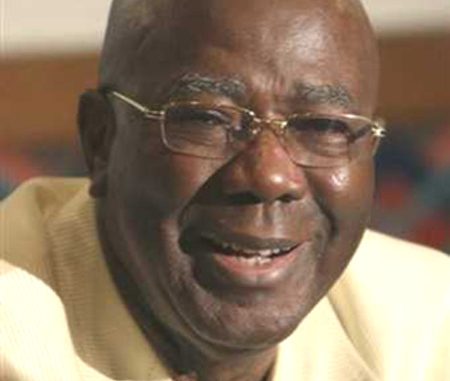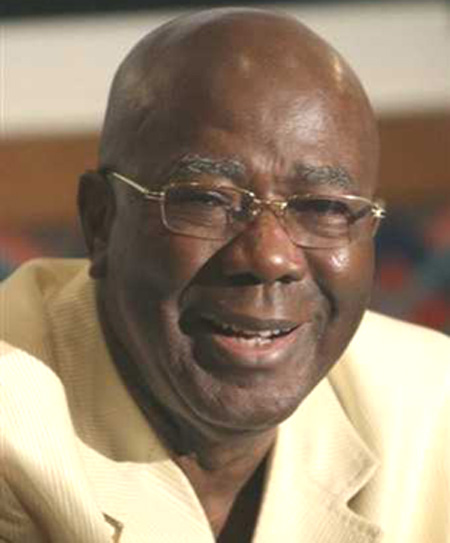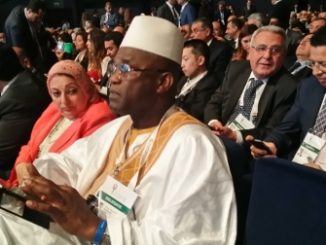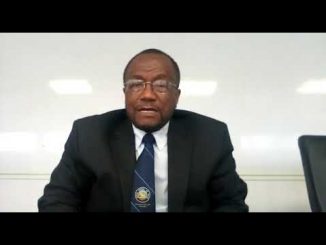
|
STATEMENT At the formal opening of the On Wednesday, 10th March, 2004
Honourable Vice-President 1. Throughout its history, Sierra Leone has scored a number of “firsts” in West Africa, in the rest of the Continent, and even in the world. These range from the establishment of the first institution of higher education in Africa south of the Sahara, and the first wired public broadcasting service in West Africa, to the issuance of the first free-form self-adhesive postage stamp in the world, and having produced the first African to receive the prestigious accolade of Knighthood in what was once the British Empire. 2. Now, Sierra Leone is scoring another ‘first’. It is making history in international humanitarian law, specifically in the area of transitional justice. It has become the first country to establish an independent mixed court to bring to justice persons responsible for serious violations of international humanitarian law and national criminal law. And not only that, the seat of the mixed court is within the territory of the country where the alleged crimes were committed. The nomenclature ‘Special Court’ is therefore appropriate. The formal opening of these premises could also be described as a special occasion. I am therefore grateful to you Mr Justice Robertson, President of the Court, for the invitation to be present at this ceremony as the guest of honour, and to formally open the Courthouse. 3. While we take pride in the establishment of this unique institution, and while we applaud the quality of cooperation between the Government of Sierra Leone and the United Nations, we cannot help but recall with deep sorrow the extraordinary circumstances that prodded us to pursue this uncharted course in the administration of justice. Never in the history of this country and of West Africa have we experienced horrendous brutality against innocent civilians on such a scale. Those acts tarnished the image of Sierra Leone, a small but peaceful, friendly and enlightened nation. 4. This notwithstanding, and long before the UN Security Council adopted resolutions stressing the need to talk to the rebels and try to end the war peacefully, and long before we were persuaded to negotiate with those who had committed heinous acts of brutality and terrorism against our people, my Government had already initiated a series of dialogue with the leader of the rebel movement. We concluded two peace agreements with him, gave him and other members of his movement cabinet and high-ranking positions. We went further to grant them the most profound and generous consideration one could imagine, namely amnesty. And lest we forget, Foday Sankoh also received absolute and free pardon under Section 63 of the Sierra Leone Constitution. 5. Mr President of the Special Court, it is relevant on this occasion to recall the judicial, moral and political risks that we took five years ago when we allowed the rebel leader Corporal Foday Sankoh, to leave this jurisdiction so that he could travel to Lom� for peace talks, even though he had been convicted, sentenced and was waiting to have his conviction reviewed by the Sierra Leone Court of Appeal. It was an unprecedented decision, one that apparently escaped the attention of the international community including the international media. The people of Sierra Leone were apprehensive that Foday Sankoh would never return to Sierra Leone to face justice. 6. However, yearning for peace, they gave me their overwhelming support, and Foday Sankoh, a convicted man, travelled out of this jurisdiction. 7. We all know what happened after Lom�. How can anyone forget the events of May 2000, less than a year after the Lom� Peace Agreement, when impunity raised its vicious head once again on an already traumatized population? 8. Mr President of the Special Court, what happened in Sierra Leone was not just an internal issue. It was not, as some erroneously described it, a civil war. It was, as I have always maintained, a war of aggression aided, abetted and fuelled by networks of ruthless merchants of illegal diamonds and illegal arms. By virtue of their acts, they were merchants of death and destruction. We were relieved when the Security Council subsequently acknowledged the international and regional dimensions of the conflict and determined that the situation was a threat to international peace and security. Therefore the suffering of the people of Sierra Leone became a matter of concern to people everywhere, to humanity as a whole. As I told the UN Secretary-General in my historic letter of 12 June, 2000, and I quote: 9. “I believe that crimes of the magnitude committed in this country are of concern to all persons in the world, as they greatly diminish respect for international law and for the most basic human rights. It is my hope that the United Nations and the international community can assist the people of Sierra Leone in bringing to justice those responsible for those grave crimes.” 10. So, this is a Special Court for Sierra Leone, a symbol of the rule of law and an essential element in the pursuit of peace, justice and national reconciliation for the people of Sierra Leone. It is also a Special Court for the international community, a symbol of the rule of international law, especially at a time when some State and non-State actors are increasingly displaying, shamelessly, contempt for the principles of international law, including international humanitarian law and human rights law. This Special Court is good for Sierra Leone. It is also good for the world today. It will certainly contribute to the jurisprudence of international humanitarian law, and enhance the promotion and protection of the fundamental rights of people everywhere. 11. Without the cooperation of the United Nations, the international community and the Government and people of Sierra Leone there would have been no Special Court. This is why I should like to take this opportunity to express sincere thanks, first to the Secretary-General of the United Nations. He responded expeditiously to my request, and the Security Council gave him only thirty days to come up with a plan based on my proposal for the creation of an independent special court. Our thanks also go to the States and organizations that have made financial and other contributions to the Court, and to members of the Management Committee for their support and oversight function. I am delighted to see their representatives present at this ceremony. 12. Let no one underestimate the formidable task and challenge that this “hybrid” institution faces and will continue to face in its lifetime. The entire world, especially the people of Sierra Leone, would be watching its proceedings, carefully. The Court must see that justice is done. It must also, as far as possible, by its proceedings and judgements, dispel any notion that it is a political tool of a particular government or group of States. This is crucial to its success because of perceptions and misperceptions about the so-called “thin line” between politics and the administration of justice on the one hand, and international politics and international law on the other. 13. On the issue of its independence and credibility the Security Council in its resolution 1315(2000) of 14 August 2000, correctly emphasized the importance of ensuring the impartiality, independence and credibility of the judicial process of the Special Court, in particular with regard to the status of the judges and the prosecutors. 14. In this connection, I would like to assure you Mr President that we have absolute confidence in the competence and integrity of all those who have been appointed to serve in the Chambers and Registry of the Court. I would also like to commend you for the effective sensitisation programme that is being conducted throughout the country. The programme is a necessary acknowledgement of the fact that (a) this particular mechanism of accountability is new to the people of Sierra Leone, and (b) it has emerged almost concurrently with the proceedings of the transitional justice mechanism embodied in the Truth and Reconciliation Commission. 15. I would strongly recommend that the Court continue, and even strengthen the sensitisation or public information programme. We note with interest recent improvements in accessibility to information on the Court’s internet website. Further improvements would ensure that the Court’s external constituencies are also kept fully and reliably informed about the activities of this new institution in international humanitarian and human rights law. 16. Mr President of the Special Court, I would like to reassure you that the Government of Sierra Leone is fully committed to the success of this Court, and will continue to cooperate with its organs at all stages of the proceedings, in accordance with Article 17 of the Statute. Such cooperation is in the interest of the people of this country, in particular the victims of the atrocious crimes that the Court has been empowered to try. 17. I would like to commend the architects who designed this impressive structure, and the builders, workers and all those who in one way or the other were recruited to lend a hand so to speak in the construction of the building within such a short time. The fact that the proceedings of the Special Court will be conducted in a spacious and relatively comfortable working environment should enhance its overall efficiency. 18. At the end of its mandate the Special Court will leave a legacy in the annals of the administration of justice in Sierra Leone and in the international community. It will also bequeath to the people of Sierra Leone a citadel of justice in the form of this beautiful courthouse. 19. I have the honour to now formally declare open the new home of the Special Court for Sierra Leone. I thank you all. |
THE SECRETARY-GENERAL
MESSAGE FOR THE OPENING OF THE BUILDINGS
OF THE SPECIAL COURT FOR SIERRA LEONE
Freetown, 10 March 2004
Delivered by Mr. Hans Corell,
Legal Counsel of the United Nations
I attach the utmost importance to the work of the Special Court for Sierra Leone. Its existence reaffirms two fundamental points: first, that those who commit or authorize serious violations of international humanitarian law are individually responsible and accountable for their crimes; and second, that the international community will exert every effort to bring them to justice in accordance with international standards of justice, fairness and due process of law.
The Special Court is the first of its kind, in that it was established by an agreement between the United Nations and Sierra Leone, at the request of the Security Council and the Government of Sierra Leone. It is a joint endeavour, in which judges appointed by the Government of Sierra Leone, other Sierra Leonean lawyers and Sierra Leonean local staff have been working side by side with international judges and an international prosecutor and registrar.
At the heart of this partnership is the belief, held firmly by both the United Nations and the Government of Sierra Leone, that if there is to be an end to impunity, if there is to be national reconciliation, and if peace and security are to be restored, it is essential that there be a credible system of justice and accountability for the very serious crimes that were committed in Sierra Leone since 30 November 1996.
Now that the Court is established and trials are about to begin, the Member States of the United Nations should live up to their responsibility and ensure that the Court has the resources it needs to do its invaluable work. The Court, for its part, must complete its work expeditiously and, in so far as it is possible, within its three-year mandate.
I would like to extend to the President of the Court, the judges and the Court’s other members my best wishes for success in the difficult work ahead. Your efforts matter greatly not only to Sierra Leone, but to the international community as a whole. In your rulings and convictions lie the capacity to advance the cause of international criminal justice, to uphold the principles of responsibility and accountability, and to build up a deterrent that could keep other military and political leaders from directing and committing atrocities in the future.
But ultimately, as its name indicates, this is a Special Court for Sierra Leone. As such it is a vital part of the healing process following a tragic and devastating period of conflict. By contributing to a process that establishes justice and the rule of law, it can play a significant role in creating a better future for all the country’s people. Let us all do our part to ensure the success of this important endeavour.
Statement
by
The Representative of the Secretary-General,
Mr. Hans Corell, the Legal Counsel of the United Nations
at
the Opening of the buildings of the Special Court for Sierra Leone
Freetown, 10 March 2004
Mr. President,
Mr. Vice-President,
Mr. Attorney-General and Minister of Justice,
Members of the Special Court,
Your Excellencies,
Ladies and Gentleman,
I have now delivered the Secretary-General’s message. Allow me a few personal remarks.
It gives me great pleasure to be here today to witness the opening of the court house for the Special Court for Sierra Leone. I was last in Sierra Leone just over two years ago, on 16 January 2002. On that day, I had the honour to sign with H.E. Solomon Berewa – then Attorney General, now Vice-President – the Agreement between the United Nations and the Government of Sierra Leone on the Establishment of the Special Court.
Much has been achieved here since that time. The opening of the buildings that we celebrate today is an important milestone, marking not only the achievements of those who have worked tirelessly to set up this Court. It also symbolizes the important work which is to follow in this new court house.
I would like to give thanks and recognition, in particular, to the work of Justice Geoffrey Robertson QC, the President of the Court, for his leadership in the Chambers of the Court; to David Crane, the Prosecutor, for the work of his Office and the Investigations Unit; to Robin Vincent, the Registrar of the Court, for all the work that he has done to ensure that the Court is up and running today; and to all those others involved in the setting up of the Court, the Witness Protection Unit and the Outreach Unit. We also thank UNAMSIL for its invaluable assistance, and we are grateful for the support and guidance of the Management Committee, some of whose members are here today.
It is also important to recognize that the establishment and operation of the Special Court is not taking place as an isolated event. Rather it is part of a process to establish justice and the rule of law in Sierra Leone, with roles to be played by both the international community and the people of Sierra Leone. As the Secretary-General mentioned, the Court is a common endeavour between the United Nations and the Government of Sierra Leone, and in this respect I wish to thank the President, Vice President, and Attorney-General of Sierra Leone who are present here today, as well as many other Sierra Leoneans, for their continued co-operation, support and guidance in the establishment of the Special Court.
I would also like to draw attention to the complementary role of the Truth and Reconciliation Commission, whose work is also supported by the United Nations. As I pointed out in January 2002, the Commission seeks to address impunity, to respond to the needs of victims, to promote healing and reconciliation, and to prevent a repetition of the violations and abuses suffered.
As I said earlier, the opening of the buildings also marks the work which is to be performed in the future – not only by the officials of the Court, but by the people of Sierra Leone in building a better future for this country.
The Court is now ready to start its work. This building, with its two trial chambers balanced to replicate the scales of justice, is a symbol of not only what has been achieved, but also for the potential of this Court. It is hoped that it will leave a legacy of justice and of the rule of law for years to come after the Special Court has fulfilled its mandate.
We hope that the Special Court, which is a different type of model to that of the other international tribunals and the first of its kind, will prove to be an exemplary model – and one that it will be efficient and expeditious. We hope that the accused awaiting trial in custody can be brought before the Court without delay, that trials will commence forthwith, and that both trial chambers will be fully operational very soon. We hope that the Court will be able to complete its work within its three year mandate, which at this stage is expected to be the end of 2005.
The Court is now ready to commence its work. I wish to express my support for all those involved in the work of the Court, in particular the Judges. As Judges of the Special Court, you bear the ultimate responsibility to help ensure that the perpetrators of crimes are brought to justice and so to contribute to the restoration and maintenance of peace and security in Sierra Leone. In discharging this trust, you offer help to future generation – a hope that no more may those whose deeds offend the conscience of mankind go unpunished, and that, in the affairs of men and women of all nations, the rule of law may prevail.
May the Special Court for Sierra Leone serve as an important contribution to the healing process that this beautiful country must undergo to create a better future for those who live here.
Thank you for your attention.
COURTESY : PETER ANDERSEN





Leave a Reply